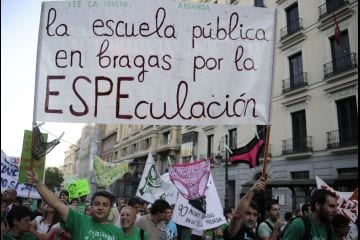THOUSANDS of teachers and pupils across Spain abandoned the classroom across Spain this week for the second general education strike in a year.
According to Public Schooling, turnout for the strike was 72% among staff at public establishments and 25% in the private sector.
However, the Ministry of Education said the figure was less than 20%.
The strike followed two weeks of protests that involved a raft of lock-ins, vigils and other demonstrations at education institutions across Spain.
Although the strike was in most part peaceful, some clashes with law enforcement were reported. In Valencia, two police offers were slightly injured in an altercation with several students.
The demonstrations follow a series of government reforms including cuts of €6.7 billion since 2010, the reinforcement of core subjects and establishing external examinations.
Critics argue that the changes will serve to create an elitist system that segregates poorer students and dismantles the concept of public education.








The french language teacher at our local school cannot speak french. Perhaps teachers should be able to do the jobs they are paid for rather than expecting a job for life regardless of ability?
Good idea. Study less. Learn less. Earn less.
My god the Spanish are bright people!!
there were two here
the Spanish education system, and results produced, are some of the WORST in the EU and Spanish children desperately need the “reinforcement of core subjects …”
But this would be too much like hard work for the socialist/anarchist and lazy teachers too often found in the country’s schools.
Is Spanish youth unemployed because they are unemployable?
Maria’s quite correct. In inland Spain class sizes are often tiny and yet children still have learning difficulties. Spanish teachers are quick to blame these learning difficulties on a raft of things, like dyslexia and dyspraxia, but never on themselves (of course.)
I think it would help if there was a sturdy system in place to help those with learning disabilities and a common core standard across the board that allows flexibility to help foster different learning styles;speaking as one of the so called “lazy” teachers( I have taught in the US and Spain).
I am always so fascinated how people bad mouth teachers and have never set foot in a classroom a day in their lives- there are two sides of every story…gee what am I thinking,it’s the usual malcontents on here yapping away.
Please get involved with the local school and help if you are really interested. I always ask not just parents but concerned members of the community to help be part of the solution not the problem.
Christine, all of us have set foot in a classroom at one time or another, as students and pupils. One does not need to be a teacher to see the issues in Spain. Parents are quite capable of evaluating their children and can see obvious failings by some teachers. Here in Spain the teaching unions are very strong and many bad teachers, which I assume you agree do exist, stay in their roles until retirement, much to the detriment of their pupils.
Fred come on now..you can not equate being a student with being a teacher, the two roles are completely different. Being a teacher you would be surprise at the failings of some parents who rely on the teacher to be the teacher and parent; what you are force to teach versus what students need to learn; how effective the teaching methods they want versus the teaching methods students need to learn. You would also have to agree there are many “bad” in any given profession. Do you really know the issues at stake here or are you going by what you read? Just because I know how a car runs and seen Top Gear does not make me a mechanic.
Christine, I judge by what I see and experience and hear from other people, teachers included (both my parents are teachers, one an OFSTED inspector coincidentally). I have also taught, albeit at postgraduate level. The primary education system in Spain is based on rote learning. It is equally boring and tiring at the same time – for the children, and parents. This style of learning pressures parents, and so many children end up doing repeat years. There are too many exams (for children aged 6+ upwards) who do weekly tests and are given reams of homework. Education here needs a total reform, with an emphasis on more personal creativity and problem-solving. From what I’ve seen in Andalucia, most children are almost destined for a job in their parents business, and will drop out of the education system very quickly to do this. Depressing, but true. Just because I mark some papers and write reams of sums doesn’t make me a teacher either, but that is how many behave here.
Fred, if that is the case then you would be for the teachers in this movement.; a lot of our arguments are what you outlined in your recent post. I will not name my CEIP but we have a group of hard working teachers thinking out the box so the students will have a chance. It’s too bad the system works against us and since a lot of us don’t know from one year to the next where the system will place us , it makes being consistent a challenge. I know some teachers once permanent, can loose focus and it can be easy after shifting place to place for years sometimes teaching 5 hours away from your family until permanent…